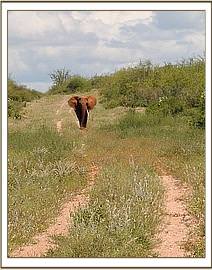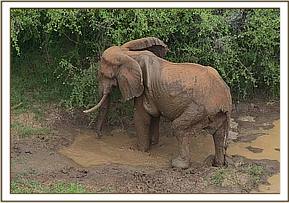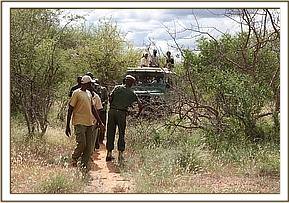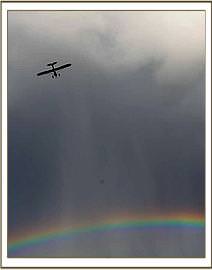The David Sheldrick Wildlife Trust helps elephants in a myriad of ways
The David Sheldrick Wildlife Trust helps elephants in a myriad of ways. Most of this work is difficult and all of it requires dedication. There are however few things that rival the challenges faced when trying to treat an injured bull elephant.
The overwhelming majority of elephants treated by the DSWT's funded three mobile vet units suffer injuries inflicted by mankind. In the region around the Trust's Tsavo Field Headquarters at Kaluku these injuries usually take the form of poisoned arrow wounds. Traditionally acokanthera poison was used. Made by the Girama tribe of the coast, a well-placed arrow was known to bring down an adult elephant in a matter of hours. Nowadays the poison seems more often just to cause terrible festering wounds and a slow agonising death that can take weeks and months.


When, recently, a middle-aged bull was seen limping towards the river with bad wounds, the Trust mobilised its air and ground units accompanied by KWS rangers to try and track him down. Having been initially sighted at midday, only a kilometre east of the river, it took only two hours before the Trust's TopCub was on the scene looking for him. The plane searched the area and the riverbank for over two hours but amazingly there no sign of him.
Returning the next morning the immediate area surrounding his last sighting was checked, then again the riverine woodland nearby. Still nothing. Checking the other side of the river soon yielded results, as he was sighted throwing mud on his wounds from a waterhole surrounded by dense vegetation. The brave and fearful male had crossed the red torrent of the Athi River, swollen from upcountry rains. He was easily identified from the air with his sole left tusk and pronounced backbone caused by the loss of condition from his injuries.


As soon as he was sighted efforts were put in to effect to get a vet and vehicle on scene. Dr Poghon, the KWS vet seconded to the Trust Tsavo Conservation Area mobile veterinary team, was contacted and could be on scene the next morning. Ongoing aerial surveillance saw the bull move little as he fed, drank and rested in the refuge of the forest. At dusk he was still seen feeding and looked like he was there for the night.
Before dawn the next morning teams started to ready themselves. En route to collect Dr Poghon the aircraft passed over his last known location but could not see him. The decision was made to push ahead and as the aircraft continued to Voi to collect the vet team a vehicle from Tsavo Safari Camp with DSWT staff moved in on the ground. Foot tracking showed where he had crossed the river and his movements within the forest, but no sign of him leaving.
Teams searched for three hours in the air and on the ground before the search was called off due to the plane acquiring two punctures. All left demoralised but not defeated and as soon as the tyres were fixed the aircraft was airborne again, but for that afternoon and for the whole of the next day there was no sign of him. He had seemingly vanished into the fresh, green vegetation that has followed the rains.


Early in the morning of the fifth day he was sighted again. He had moved further away from the river up a seasonal river system and was drinking and again throwing mud on his wounds. All were ready to give it a second try. He was sighted again at three separate times that morning, including once by Dr Poghon himself enroute to the Tsavo Safari Camp airstrip in an effort to avoid yet more punctures. It look less than two hours for Dr Poghon and the ground team to cut a road in, but he was nowhere to be found. He had vanished again!
Further ground tracking and aerial searching brought no sign of him. That evening the ground team returned to camp on foot, having suffered yet more punctures, this time to the car.
The search still goes on and on Friday morning 3rd May it was conducted by helicopter. We are confident we will find and help this poor fellow, suffering immensely for the needless wanting of people a continent away, and we will not stop searching until we do.


Our deepest thanks go out to the staff and owners of Tsavo Safari Camp who have helped us with generosity and enthusiasm and to Vier Pfoten for funding the mobile vet units, and to the generous donor who has funded the Trust's Sky Vets initiative and in this case the helicopter time.
Will keep you posted.
The DSWT Field Teams